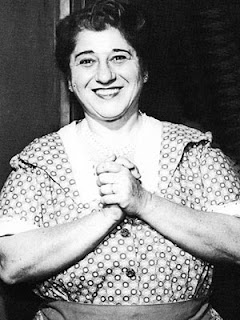“I never liked Lucy,” my aunt remarked as she chased some stray Chex Mix around the basin of the yellow Tupperware bowl teetering on the edge of her recliner, cocked firmly in the “recline” position. She continued after taking a slug of her Pepsi and delicately flicking the crumbs from her billowing, orange and fuchsia Muumuu, “I thought she was an embarrassment to women.” The paradox that plagued women on the stage (i.e. humiliating themselves for laughs) seemed to follow comediennes like the Lucy in question, Lucille Ball, into the grainy era of celluloid magic: television. Wacky housewives, ditzy secretaries and adorably clueless gal pals populated early sitcoms, prompting the observation that maybe my aunt had a point; maybe everything old was new again, reheated and served up on our television trays. Or maybe, like so many women who joked it up before them, sitcom pioneers were merely using the tools at their disposal such as racial stereotypes, class distinctions, and cultural values to dismantle the social climate and political ideologies responsible for circumscribing them in limiting roles. Ahem. Or maybe they were incredibly hard working, talented, intelligent, driven professionals who knew how to make serious comedy.
Before Lucy spent six seasons sneaking into Ricky’s show biz act, stuffing bon-bons down her blouse, and stingingly hilariously off-key, Molly Goldberg was kvetching her way into the hearts of American television viewers. Yoo-Hoo! Mrs. Goldberg, one of the first American sitcoms, starring Gertrude Berg as the spunky, matronly housewife, Molly Goldberg, presiding over the colorful characters in her family and in the neighborhood. It was easy to laugh at and with Molly Goldberg; the show opened with the thwap of a shade and Berg’s face filling the window frame. “Oh hello!” she exclaimed. “Hello is such a small word to say, I want to say hello to all of you with every letter of the alphabet!” It would also be easy to dismiss Molly as one of those daft housewives if it hadn’t been for the fact that Berg created, wrote and starred in the show becoming the first woman to win an Emmy in 1950 for her work.
While Mrs. Goldberg may have been “just a housewife,” she and her off-screen self (Berg) actually possessed a lot of power and influence over their limited sphere. Say what you want about Lucy cramming eggs in her pants or dressing in drag, she made it into Ricky’s spotlight more than she got the hook, and Ball herself was the first woman to head her own production study, Desilu, responsible for producing and maintaining syndication rights to her highly acclaimed, long-running show I Love Lucy. Likewise, characters such as Edith Bunker and Megan Mulally’s Karen Walker may have read as vapid airheads, playing into the most egregiously sexist notions of women as objects (sexual or domestic). However, in both cases Edith and Karen provide something that transcends these one-dimensional caricatures of women: moments of truth, critique and real emotional vulnerability.
The list that follows these women could crash the largest Wiki, but include an apologetically small sample of other historically defining, perception shattering figures as Bea Arthur’s Maude; Mary Tyler Moore’s Mary Richards and Valerie Harper’s Rhoda Morgenstern; Vicki Lawrence’s Mama; Roseanne Bar’s Roseanne Connor; Suzanne Pleshette’s Emily Newhart; Rhea Perlman’s Carla Tortelli; Tina Fey’s Liz Lemon; Julia Louise-Dreyfous’ Elaine Benes and the many other smart, funny and interesting female sitcom characters yet-to-be-realized.
Sample Gertrude Berg video here.
| |

No comments:
Post a Comment